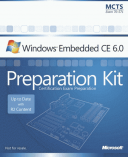Книга: Microsoft Windows Embedded CE 6.0 Exam Preparation Kit
Lesson Summary
Lesson Summary
Windows Embedded CE supports exception handling and termination handling natively. Exceptions in the processor, operating system, and applications are raised in response to improper instruction sequences, attempts to access an unavailable memory address, inaccessible device resources, invalid parameters, or any other operation that requires special processing, such as dynamic memory allocations. You can use try-except statements to react to error conditions outside the normal flow of control and try-finally statements to run code no matter how the flow of control leaves the guarded __try code block.
Exception handling supports filtering expressions and filtering functions, which enable you to control how you respond to raised events. It is not advisable to catch all exceptions because unexpected application behavior can be the result of malicious code. Only handle those exceptions that need to be dealt with directly for reliable and robust application behavior. The operating system can forward any unhandled exceptions to a postmortem debugger to create a memory dump and terminate the application.
EXAM TIP
To pass the certification exam, make sure you understand how to use exception handling and termination handling in Windows Embedded CE 6.0 R2.




